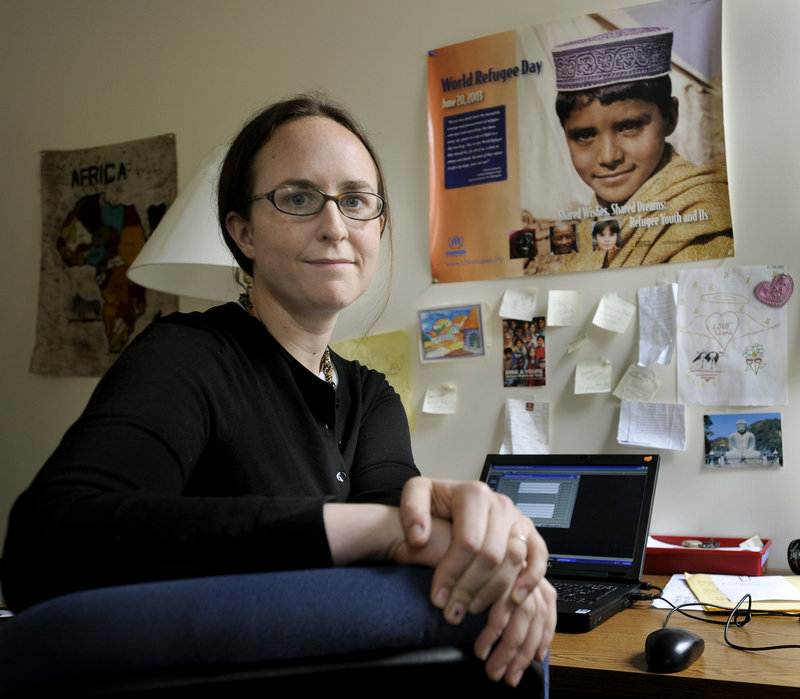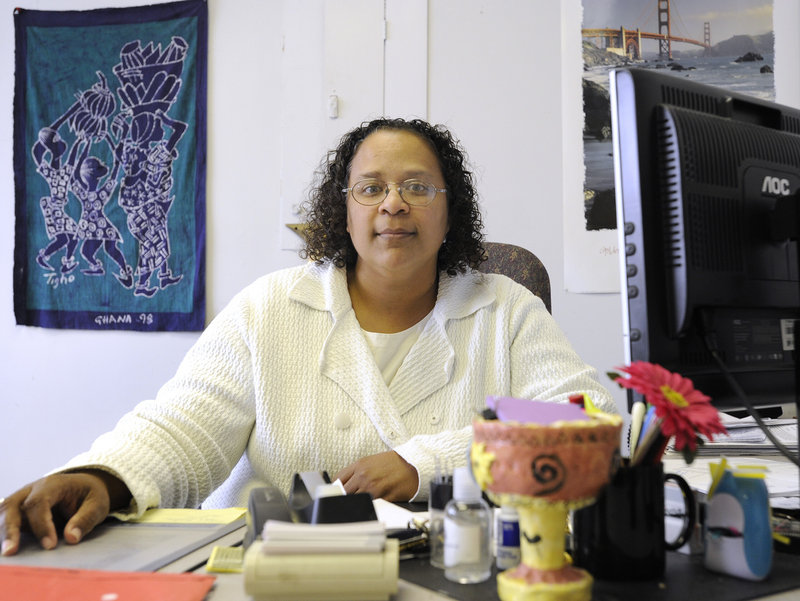PORTLAND – Regina Phillips knew they were here.
Among the thousands of refugees and immigrants, from such places as Rwanda, the Democratic Republic of Congo and Iraq, are people quietly bearing the deep scars of confinement, beatings, rapes and other forms of torture.
Phillips is director of Portland’s Refugee Resettlement Services, which works with private and charitable groups to help refugees start new lives and heal from the traumatic experiences that brought many of them here.
But until now, the groups had not asked about torture experiences or focused on the special burdens carried by survivors of torture.
“It’s real sensitive kinds of things,” Phillips said. “It’s very intensive.”
Supported by a $1 million, three-year federal grant, the city and its partners launched a new program for survivors of torture in January, offering counseling and other assistance to 36 men and women. There are believed to be hundreds more who could qualify for help, although officials say it will take time to break through cultural stigmas, shame and fear.
Molly McMahon, a social worker with Community Counseling Center, has been counseling refugees traumatized by wars and violence for five years as part of the safety net set up for immigrants arriving here. But the horrors she has listened to from torture victims have taught McMahon new lessons about the depths of human behavior and about survival, she said.
“I’ve heard a lot of stories about war and trauma for quite a while,” she said. “Now, it’s just like I’ve entered into a new world of different types of cruelty. But at the same time I’m so amazed at people’s strength and resiliency. It has definitely opened my eyes.”
The experiences and needs of the victims vary, although the nature of torture — captivity and severe, systematic abuse — means the damage is often intense and buried deep. Some have been confined for long periods and repeatedly beaten. Many, both men and women, have been raped or sexually mutilated. Some have been forced to watch others tortured, according to McMahon.
“That has some of the strongest impacts,” she said. “Especially when it’s their family members. That has happened a lot.”
Survivors must have been detained and tortured by someone acting on behalf of a governing authority — legitimate or not — to qualify for the specialized services. They were often targeted because of political positions, ethnicity or religion. “It’s really a way to control a group of people, to instill fear,” McMahon said.
PRESERVING ANONYMITY
She and other officials asked torture survivors they thought might be able and willing if they would be interviewed for this story. None agreed to be quoted by name or photographed, often because of concerns that it could put family members overseas at risk, they said.
One new resident of Portland agreed to speak to a reporter under the condition that his name not be published. The man said he is afraid for the safety of his wife and children in Rwanda and believes any publicity could endanger them. He is seeking asylum and hopes to bring his family here.
A Tutsi businessman at the time of the Rwandan genocide in 1994, he described how, at that time, he was repeatedly threatened with death before being taken to the edge of a large mass grave and cut with machetes. He was pushed into the grave and left for dead.
“a miracle, I came out,” he said. “When God decides it’s not your time, it is not your time.”
The man paused at times as he told this story, then went on. But he stopped before discussing more details of the confinement and torture that qualified him for the city’s new program.
“You live with permanent fear,” he said. “Some of the times, you have funny behaviors you don’t even know why.”
He said he wants other people who feel isolated and alone to know that help is available.
“When you have suffered torture, you feel like the best way of healing is to keep it to yourself, and it isn’t. It’s killing you,” he said. “It’s in your mind and it doesn’t go away.”
Now, he has been able to tell his story to his counselor for the first time. He talks with other torture victims and exercises at the YMCA. And he has hope, he said.
“Somehow, it’s getting better. I can call it a life-changing program.”
And he has seen it work for others, too. “I will see a person who is dying, considering suicide,” he said. “Then I’ll see him alive again with a big change.”
The Portland torture survivors’ program is funded by a grant to the city from the U.S. Department of Health and Human Services Office of Refugee Resettlement, Catholic Charities Maine and Community Counseling Center. It is one of about 30 similar programs around the country.
WORKERS CHALLENGED
The grant includes specialized training for social workers, caseworkers and interpreters, one-on-one counseling, group sessions, fitness programs and research into the scale of the overall need in Portland.
Leaders of the program say they have been surprised and challenged by the stigma and shame that keep many torture victims from accepting help. They also are learning how challenging it is to hear some of the stories.
Interpreters who translate for some of the victims during counseling sessions are now meeting with social workers in their own support group because of the emotional toll of the work. In at least one case, an interpreter had to stop a session.
“They are hearing stories over and over,” said Phillips. “Parents being killed in front of children. It’s difficult information to hear and then try to interpret to a counselor.”
RELUCTANCE TO SHARE
The Center for Victims of Torture, which opened in 1985, works with about 250 torture victims at a time and also could not refer a reporter to a survivor willing to be interviewed. There is an especially strong reluctance to share their painful past among refugees who want to start new lives, said Peter Dross, director of policy and development for the Minnesota-based center.
“Torture is such a shaming and guilt-producing experience for the victim. Many times they’re not really all that interested in reliving that torture,” he said. “About 20 percent of our clients were tortured as children, usually as a weapon against their parents.”
Safety also is a common concern for the survivors. “Their family could become targets. That is a real fear and that has happened,” Dross said.
But the benefits of providing help have been clear, he said. Torture survivors have a proven capacity to endure and recover, and a lot to offer their new communities if they’re given a chance to heal, he said.
“They were leaders in their home communities. They tend to be highly educated, highly skilled. They had the resourcefulness to somehow escape and make their way to a country of refuge,” he said.
Leaders of the Portland effort still don’t know exactly how many torture survivors now live in the Portland area or might benefit from the program. The first wave is a good beginning, Phillips said, and there will be more.
“We knew once we started working with folks it would be needed,” she said.
Staff Writer John Richardson can be contacted at 791-6324 or at:
jrichardson@pressherald.com
Send questions/comments to the editors.



